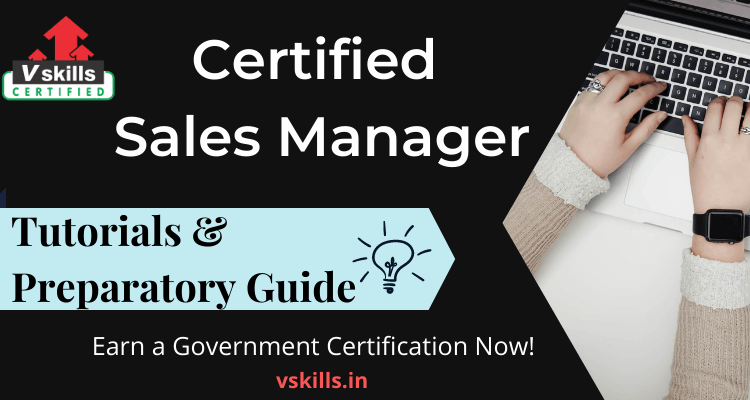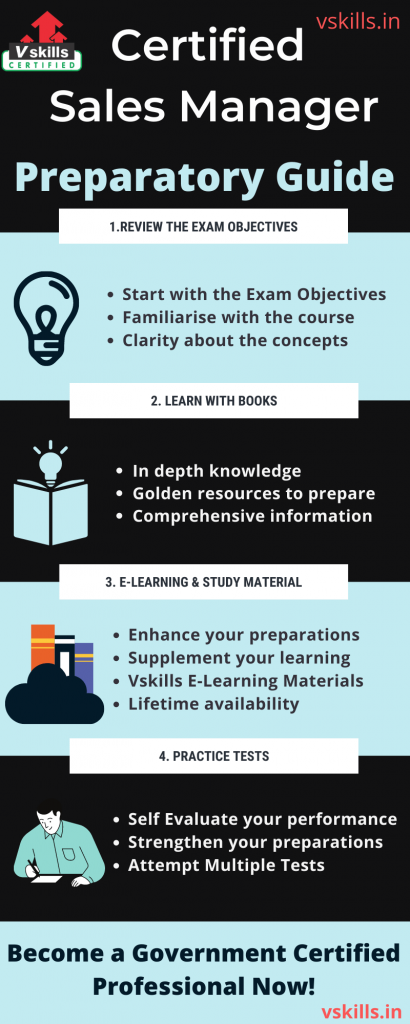
The Certified Sales Manager plays a key role in the success of an organisation. Sales Managers focus on achieving high sales and eventually generating revenue for the company. They devise strategies for achieving their sales targets and therefore have a crucial role in deciding the future course of an organisation. This certification exam equips you with the industry relevant skills and enhance your employability. Moreover, it provides you competitive advantage and turns you into a valuable asset for your company.
Why Become a Certified Sales Manager?
The importance of a sales manager in any organisation is paramount. Moreover, sales is an essential skill in all career paths. This certification is designed to prepare you for the role of a sales manager. It will validate your expertise and provide you with the knowledge of practical tools. Additionally it will prove your professional commitment and help you grab higher paying jobs. The demand for Certified Sales Manager is really high as companies specialising in marketing or sales are constantly hiring. Top MNC’s and organisations like Bharti AXA Life, Samsung, LG, ITC, HUL, Raymond, SBI Cards, Fedex are some of the recruiters.
Who is this Certification for?
This certification is intended for professionals who want to excel in their careers. It targets those who are already working and want to expand their knowledge horizon. Moreover, job seekers looking for employment in sales department should definitely have this certification.
Roles and Responsibilities of a Sales Manager
A Certified Sales Manager is primarily responsible for meeting the sales target of the organisation through effective planning and budgeting. They perform the following roles
- Firstly, Meeting planned sales goals
- Secondly, Setting individual sales targets with the sales team
- Further, Tracking sales goals and reporting results as necessary
- Moreover, Understand your ideal customers and how they relate to our products
- Then they must target potential customers and generate leads for the organization
- Also, motivating their team members to ensure efficiency in work
Career paths in sales
Sales professionals are still in high demand, making them a good choice for job seekers looking to put their people and communication skills to good use when advancing their careers. Let us look at career paths in sales.
Vskills Certified Sales Manager
The Vskills Certified Sales Manager is responsible for identifying, increasing and managing sales. The certification will teach you various areas of sales like sales forecasting, sales organization structure, recruiting and training sales personnel, motivation, compensation, budgeting, channel management, evaluation and control of team and supply chain management. Key areas covered in this exam are
- Sales Management
- Objective & Scope of Selling
- Buyer Seller Dyad
- Personal Selling
- Theories of Selling
- Selling Process
- Prospecting, Objection Handling & Closing
- Sales Forecasting
- Market Potential
- Economic Model Building
- Functions of a Sales Person
- Types of Sales Organisation Structure
- Recruitment & Selection Process
- Training Objective & Methods
- Theories of Motivation
- Devising Compensation
- Standards of Performance Qualitative, Quantitative
Benefits of this Certification
Vskills is India’s largest certification providers. They provide candidates access to top exams as well as after exam benefits. Moreover Vskills certification guarantee the following benefits:
- To begin with, the certifications will have a Government verification tag.
- Moreover, this certification is valid for life.
- Also, you get Lifelong e-learning access.
- Likewise you get Access to Free Practice Tests.
- Further, you will get tagged as ‘Vskills Certified’ On Monsterindia.com and ‘Vskills Certified’ On Shine.com.
Exam Process

Exam Details : Certified Sales Manager
- Duration: 60 minutes
- No. of questions: 50
- Maximum marks: 50
- Passing marks: 25 (50%).
- There is NO negative marking in this module.
Course Outline
Objective and Scope of Personal Selling
- Sales Management as defined by
- Objectives of Sales Management
- Sales Executives as Coordinator
- Coordinating with Advertising
- Co-ordination with Production
- Co-ordination with Human Resource
- The Four Sales Channels
- Sales Management in the 21st Century
- A Five-Step Remedy
- “Top Gun” Sales Managers
Buyer Seller Dyad and Personal Selling Situations
- Buyer Seller Dyad
- Diversity of Personal-selling Situations
- Recent Trends In Selling
- Team Selling
- Sales Force Automation (SFA)
Theories of Personal Selling
- Theories of Selling
- “Right Set of Circumstances” Theory Of Selling
- “Buying Formula” Theory of Selling
- “Behavioral Equation” Theory
Personal Selling Process
Prospecting, Objection Handling and Closing
- Prospecting
- Formulating Prospect Definitions
- Searching out Potential Accounts
- Sales Resistance
- Closing Sales
Sales Forecasting-I
- Types of Personal-Selling Objectives
- Analyzing Market Potential
- Market Indexes
- Sales Potential and Sales Forecasting
- Sales Forecasting Methods
- Qualitative Forecasting Methods
- Poll of Sales Force Opinion
- Survey of Customers’ Buying Plans
Sales Forecasting-II
- Projection of Past Sales
- Time Series Analysis
- Regression Analysis
- Exponential Smoothing
- Econometric Model Building and Simulation
- Converting Industry Forecast to Company Sales Forecast
Functions of Salesperson
- The Effective Sales Executive
- Nature of Sales Management Positions
- Position Guide-Sales Manager
- Functions Of The Sales Executive
- Qualities of Effective Sales Executives
- Relations with Top Management
- Relations with Managers of Other Marketing Activities
Purpose of Sales Organization
- The Sales Organization
- So what is the Purposes of Sales Organization?
- Setting Up A Sales Organization
- Determination of Activities and Their Volume of Performance
Types of Sales Organisation Structure
- Basic Types of Sales Organizational Structures
- Functional Sales Organization
- Committee Sales Organization
- Field Organization of the Sales Department
- Centralization versus Decentralization in Sales Force Management
- Schemes For Dividing Line Authority in the Sales Organization
- Dividing Line Authority on More than One Basis
Recruitment Process
- Recruiting Sales Personnel
- Organization for Recruiting and Selection
- The Pre-recruiting Reservoir
- Sources of Sales Force Recruitment
- Sources Within the Company
- Sources Outside the Company
- Employment Agencies
- Sales People Making Calls on the Company
- Sales Forces of Competing Companies
- What is the Recruiting Effort?
- Personal Recruiting
Selection Process
- Selecting Sales Personnel
- Pre-interview Screening and Preliminary Interview
- Formal Application Form
- The Interview
- References
- Credit Checks
- Employment Tests
- Physical Examinations
Training Objective Training Methods
- Planning Sales Training Programs
- Building Sales Training Programs
- Defining Training Aims
- Deciding Training Content
- Selecting Training Methods
- Role Playing
- Organization For Sales Training
- Evaluating Sales Training Programs
Theories of Motivation
- Motivating Sales Personnel
- Meaning of Motivation
- Why Salespeople Need Motivation?
- Needs are either primary or secondary
- Maintaining a Feeling of Group Identity
- Achievement-Motivation Theory
Devising Compensation
- Compensating Sales Personnel
- Requirements of A Good Sales Compensation Plan
- Devising A Sales Compensation Plan
- Consider the Company’s General Compensation Structure
- Consider Compensation Patterns In commodity and Industry
- Special Company Needs and Problems
Types of Compensation Plans, Fringe Benefits
Standards of Performance Qualitative, Quantitative
- Controlling Sales Personnel
- Standards of Performance
- Relation of Performance Standards to Personal Selling Objectives
- Quantitative Performance Standards
- Qualitative Performance Criteria
Recording of Actual Performance
Evaluation and Control Through Action and Supervision
- Controlling Sales Personnel Through Supervision
- Qualifications of Sales Supervisors
- The Supervision Activity
Purpose of Sales Budget
- Sales Budget
- Budgeting and Strategic Planning
- Purposes of Budgeting
- Determining the Sales Budget
- Budgeting by the Objective and Task Method
- Budgets for Sales Department Activities
- The Budgeting Process for the Firm
- Budget Periods
- The Budget-Making Procedure
- Managing with Budgets
Objective in Using Quotas
- Quotas
- Purposes of Sales Quotas
- Quotas, the Sales Forecast, and the Sales Budget
- Budget Quotas
- Activity Quotas
- Combination Quotas
Procedure of Setting Quota, Limitations of Quota System
- Procedures for Setting Sales Volume Quotas
- Administering the Quota System
- Securing and Maintaining Sales Personnel’s Acceptance of Quotas
- Typical Administrative Weaknesses
Concept of Sales Territory
Need for Establishment and Revision of Sales Territory
- Reasons for Establishing or Revising Sales Territories
- Providing Proper Market Coverage
- Controlling Selling Expenses
- Assisting in Evaluating Sales Personnel
- Contributing to Soles Force Morale
- Aiding in Coordination of Personal Selling and Advertising
- Procedures for Setting up or Revising Sales Territories
- Determining Sales Potential in Each Control Unit
- Combining Control Units into Tentative Territories
Assignment of Sales Personnel to Territories
Importance of Customer Feedback By Sales Personnel
Marketing Channel
- What is Marketing Channel?
- The Nature of Marketing Channels
- Types of Intermediaries
- Contemporary Channel Scenario in India
- Firms Go in for Non-traditional Channel Arrangement
- Firms Embrace Non store Retailing
- Direct Selling/Home Selling
- Multi-level Marketing (MLM)
- Network Marketing
- Independent Direct Selling Outfits
Objective of Marketing Intermediaries
- Objectives of Marketing Intermediaries
- Channel Objectives Differ from Firm to Firm; Consequently, their Channel Designs Differ
Function of Marketing Channel
- What is the Work of the Marketing Channel?
- Channel is Perform Many Vital Distribution Functions
- Provide Salesmanship
- Help in Price Mechanism
- Assist in Merchandising
- Provide Market Intelligence
- Act as Change Agents and Generate Demand
- Channel Decisions have a Bearing on Other Marketing Decisions
Channel Design
- Designing A Channel System
- Formulating the Channel Objectives
- Linking Channel Design to Product Characteristics
- Channel Design: Segmentation
- Channel Design: Positioning
- Resolving Channel Conflicts
Selection of Appropriate Channels
- The New Business Environment
- General Impact of Environmental Changes on Business
- The Importance of SWOT Analyses
- The Channel Decision
- Dealer Selection
- ‘Dealer Wanted’ Ads
- Evaluating the Alternatives and Selecting the Best
- Choosing The Channel Intensity
- Choosing The Number of Tiers Correctly
- Selecting Appropriate Variant within a Given Design
- An Eye on The Future is Essential
Channel Management
- Managing The Channel Member
- Territory of Operation
- Trade Margin
- Functions The Principals Have To Perform
- Regular; Adequate and Prompt Supply
- Ensuring Right Store Image
- Performance Appraisal of Channel Member
- Training and Development
Channel Motivation
- Motivational Tools and Control Areas
- Motivation of The Distributor
- Remuneration of the Salesperson
- Salary Only
- High Basic Salary Plus Bonus on Trading Profit
- Setting Sales Targets by Product Range
- Risk Management
- Trade Margin, a Major Motivator
- Dealer Incentives
- Effective Communication
Physical Distribution Concepts and Objective
- Physical Distribution, Marketing Logistics, and Supply Chain Management
- The Physical Distribution Concept
- Supply Chain Management (SCM)
- Materials Management
- A Promising Area for Cost Reduction
Components of Physical Distribution
- Inventory Management
- Production Control and Materials Requirement Planning
- Just-in-Time (JIT) Logistics Systems
- Planning A Logistics Strategy
Transportation
Warehousing
Impact of it on Physical Distribution
- Introduction
- The Level of Information Sharing
- Exchanging Order Information
- Sharing Operations Information
- Summary and Insights
Implication of Supply Chain Management in Physical Distribution
- What is Supply Chain Management?
- Efficient Consumer Response
- Putting it All Together: What is the Right Supply Chain?
- Supply Chain Management: Why Only Now?
Preparatory Guide : Certified Sales Manager
Getting certified for your knowledge and skills boosts your confidence and provides you with immense credibility. This certification will bring in various new opportunities in your career. You need a preparation plan to crack this exam. So we provide you with our Preparatory Guide that will set you on the right track. It will equip you with expert resources so you can ace the exam.

Step 1- Start with the Exam Objectives
The first step in your preparation guide should always be to review the exam objectives. Familiarising with the exam course outline will help you score better in the exam. Tailoring your study plan around the concepts covered in this exam will help you plan your preparations. This will escalate your skills and expertise. This exam covers the following objectives:
- Objective and Scope of Personal Selling
- Buyer Seller Dyad and Personal Selling Situations
- Theories of Selling
- Personal Selling Process
- Prospecting, Objection Handling and Closing
- Sales Forecasting-I
- Sales Forecasting-II
- Functions of Salesperson
- Purpose of Sales Organization
- Types of Sales Organisation Structure
- Recruitment Process
- Selection Process
- Training Objective Training Methods
- Theories of Motivation
- Devising Compensation
- Types of Compensation Plans, Fringe Benefits
- Standards of Performance Qualitative, Quantitative
- Recording of Actual Performance
- Evaluation and Control Through Action and Supervision
- Purpose of Sales Budget
- Objective in Using Quotas
- Procedure of Setting Quota, Limitations of Quota System
- Concept of Sales Territory
- Need for Establishment and Revision of Sales Territory
- Assignment of Sales Personnel to Territories
- Importance of Customer Feedback By Sales Personnel
- What is Marketing Channel?
- Objective of Marketing Intermediaries
- Function of Marketing Channel
- Channel Design
- Selection of Appropriate Channels
- Channel Management
- Channel Motivation
- Physical Distribution Concepts and Objective
- Components of Physical Distribution
- Transportation
- Warehousing
- Impact of it on Physical Distribution
- Implication of Supply Chain Management in Physical Distribution
Step 2- Books are your bestfriends!
Books have been the best way to prepare for any exam. Studying the traditional way through books books is a golden step to enhance your learning process. These books offer in depth knowledge about the exam. Most important of all, you can find real-time examples of the different concepts you learn for the Certified Sales Manager exam. In addition, books are also useful for cross-referencing and verifying the authenticity of the information from other learning resources. Therefore get your hands on these books to earn this much valued credential:
- Sales Management. Simplified by Mike Wienberg
- Cracking the Sales Management Code by Jason Jordan
- Nuts and Bolts of Sales Management by John R. Treace
- Sales Manager Survival Guide: Lessons From Sales’ Front Lines by David Brock
Step 3- Refer the Right Resources
Learning with the right resources plays a key role in your preparations. You must choose your learning resources very wisely. These resources are solely responsible for determining the level of your knowledge. They guide you throughout your preparation process. The market place is full of these resources and making the right choice can be really difficult. Therefore Vskills offers you its E-Learning Study Material to supplement your learning experience and exam preparation. This online learning material is available for lifetime and is updated regularly. Moreover, these e-learning resources also come with hard copy study material that expands your knowledge horizon.
Refer- Certified Sales Manager Sample Chapter
Step 4-Self Evaluate Practice Tests
Mistakes are inevitable, but surely, they can be limited. When it comes to exams, practice papers help a lot in limiting the mistakes. Moreover, training the brain is very essential. Practice papers give that simulation in which the brain needs to get used to the actual exam. Other than knowledge, there are many factors that can affect your performance in the exam. Also, these include confidence, speed, understanding the marking scheme, physical and mental alertness and concentration, and more. Thus, going through practice tests helps you find your strengths and iron out your weaknesses. They make you understand the areas you’re lacking behind and work upon them. Most importantly, make sure that you are going through practice tests once you have gone through the whole syllabus. Get Ready to Self Evaluate your preparations with Practice Tests!
Upgrade your knowledge and enhance your skills by becoming a Certified Sales Manager. Start Preparing Now!
Prepare for Job Interview
If you are looking for a role of sales manager, then you must checkout these interview questions, which will help you to prepare for sales manager role and enhance your knowledge as well.




